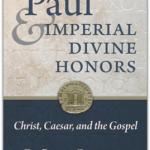David wants to build Yahweh a house, Nathan the prophet encourages him. Then Yahweh appears to Nathan to correct him and give directions to David. The nighttime oracle is actually two oracles (noted by William Johnstone, 1 & 2 Chronicles).
Each has the basic structure of a covenant formula: A declaration of the sovereign; a recital of history; and then the terms of the covenant. Both begin with a “Thus says Yahweh” (1 Chronicles 17:4, 7). Both review Yahweh’s history with Israel. The first briefly recounts the Lord’s peripatetic life since the time of the exodus and through the time of the judges, walking with Israel, moving from house to house (vv. 5–6). The second oracles focuses on Yahweh’s history with David himself: He took David from the pasture, elevated him to be prince, and has gone with David wherever he has walked (vv. 7–8). The second oracle continues in this covenantal vein by stating Yahweh’s perpetual commitment to Israel, David, and David’s seed (vv. 8–13).
The climax that leaves David breathless is the promise that David’s son will be Yahweh’s son, resident in Yahweh’s own house (v. 14). This promise is multi-layered: Yahweh builds a house for David, a people house, and David’s son will have his throne in that house. David’s son will build a house for Yahweh, the temple, and David’s son will have a place in that house as well, since Solomon’s palace is part of the temple complex in Jerusalem (cf. 1 Kings 6-8). This isn’t simply a promise that David’s house will continue to rule Israel; it’s a promise that David’s seed will fulfill the destiny of the human race, royal sonship to Yahweh.
Why the double form of the oracle? Why not just get to the covenant commitment in the second oracle? Why not just present the theology of temple reciprocity – Yahweh builds house for David, David’s son builds house for Yahweh, Yahweh places David’s son in His house? The question is sharper when we realize that, for all its formal similarities to a covenant form, the first oracle ends with a question. Most covenants are of this form: I am the King; I have done this and that for you; so, you do this and that for me. Here it’s: I am Yahweh of Hosts; I have been with Israel; would I ever ask for anything from you?
That question is essential if we are going to get the temple theology right. As Johnstone points out (1.202), the passage highlights the absurdity of reciprocity in dealings with God. By reminding David that He needs no house, He is reminding David of the utter asymmetry of their relationship. And that is an essential point of theology proper, if Israel is going to understand the temple and its services rightly. Yahweh’s needlessness, His aseity, sets Him radically off from the gods of the nations, who depend on temple-building kings and their offerings of food and service.
The first oracle establishes a “sacramental” principle of temple theology (Johnstone’s term). Will Yahweh be in the temple? Yes, His name is there; but no, no house, including the house of the cosmos, can contain Him. He is/is not there, in loco. Both poles of the paradox are essential. To deny the “is” is to call God a liar, for He has pledged to make Himself available to His people. To deny the “is not” is to call God a liar, because a God who is contained within a temple is no God, not the Lord and Creator of the universe. Within this “sacramental” framework, Israel will inevitably fall into pagan idolatry, confident they can manipulate and control the God who cannot be controlled. Again, the proto-temple theology is an essential foundation for the temple theology itself.
Now: Think incarnation. Think ecclesiology. Think real presence. And remember the proto-temple theology.















